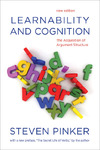Please use this identifier to cite or link to this item:
http://lib.hpu.edu.vn/handle/123456789/33357| Title: | Learnability and Cognition: The Acquisition of Argument Structure |
| Authors: | Pinker, Steven |
| Keywords: | Cognitive science Language Linguistics |
| Issue Date: | 2013 |
| Publisher: | MIT Press |
| Abstract: | Before Steven Pinker wrote bestsellers on language and human nature, he wrote several technical monographs on language acquisition that have become classics in cognitive science. Learnability and Cognition, first published in 1989, brought together two big topics: how do children learn their mother tongue, and how does the mind represent basic categories of meaning such as space, time, causality, agency, and goals? The stage for this synthesis was set by the fact that when children learn a language, they come to make surprisingly subtle distinctions: pour water into the glass and fill the glass with water sound natural, but pour the glass with water and fill water into the glass sound odd. How can this happen, given that children are not reliably corrected for uttering odd sentences, and they don't just parrot back the correct ones they hear from their parents? Pinker resolves this paradox with a theory of how children acquire the meaning and uses of verbs, and explores that theory's implications for language, thought, and the relationship between them. |
| URI: | https://lib.hpu.edu.vn/handle/123456789/33357 |
| ISBN: | 9780262518406 |
| Appears in Collections: | Sociology |
Files in This Item:
| File | Description | Size | Format | |
|---|---|---|---|---|
| Learnability-and-Cognition.pdf Restricted Access | 4.54 MB | Adobe PDF |  View/Open Request a copy |
Items in DSpace are protected by copyright, with all rights reserved, unless otherwise indicated.
